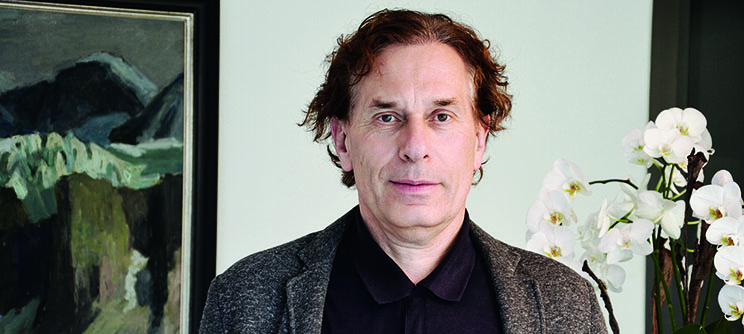


Where is the line between enjoying a glass of wine at dinner and being an alcoholic? Why are some people able to enjoy the best wines all their lives while others hit rock bottom in just a few years? A close friend, someone you know so well, turns into a stranger, perhaps a passive, aggressive one.
One should not despair, however: Swiss medicine has been continuously looking for more and more new ways to overcome this problem once and for all. Dr. Claus Aichmuller, the leading addiction specialist at Privatklinik Meiringen, has been helping people to overcome their alcohol addiction for many years.
– Dr. Aichmuller, have any new methods of treating alcoholism appeared recently?
– Today, medicine relies widely on the bio-psycho-social model to explain alcoholism. Biological factors include the individual ability of the body to metabolize alcohol (one person can do this faster than another) and genetic factors. Psychological factors define the patient’s vulnerability to alcohol addiction. People subject to frustrations are susceptible and vulnerable, because they take conflicts hard and thus are at risk. The third factor is the social environment: the method looks at external reasons (the “microcosmos”) that may cause alcohol dependency, such as unemployment, family conflicts, or crises. Modern alcohol treatments are based on this model and include psychotherapy, socio-therapy, stress management and the use of drugs. Additionally, alcoholism is common with anxiety disorders and depressive disorders.

– At what age are you at the maximum risk of becoming addicted?
– We assume that alcoholism is a chronic disease, which is impossible to “shut off”. It will aggravate if left unattended.
As a rule, it starts at 18-25, when young people start visiting night spots and regularly return home drunk. Then they receive their professional education, begin to work, get married, and 2have children. Less and less time is left over for fun. By the age of 30-35, they store up their problems, have conflicts at work and in their family, and allow themselves to drink a jug of beer in the evening ever more frequently… There seems to be no reason for worrying at first. In a few years though, usually after the age of 40, it turns out you have developed an alcohol dependence. Often you can keep it from your family and peers for a long time, but you are sure to lose control one day.
Our patients come to our clinic already burdened with family or job conflicts, or after a traffic accident, or when health problems have occurred… when they have become aware that alcohol has grown into too big a problem, one that it is impossible to keep secret any longer.
– It has been argued that unlike men, alcoholism in women is incurable. Has this attitude changed today?
– I would not agree with this. Treatment results are the same for men and women, but it must be noted that many addicted women are not included in statistical reports, because they keep drinking on the sly in order to keep it secret. Society is much more tolerant of men’s drinking as they are sometimes allowed to get drunk, and it is no big deal, but everybody throws stones at women drinking. In general, however, there are many more males addicted than females.
– Do you offer any successful treatments for this dependence?
– Efficient new methods have been developed recently, and the clinic applies most of them. The standard treatment plan includes in-patient therapy and further outpatient treatment. A special focus of the treatment is personally tailored psychotherapy with individual and group therapy. But modern biological therapies are also used. Working patients will need a psychiatrist’s help and home care assistance. Sometimes they need medical advice by telephone or via the Internet, if a patient lives far away from the clinic.
– How do you handle language issues: for example, if a patient speaks no English or German?
– Group therapies are only in German. But in the private department we offer foreign patients an individual therapy program, partly with the help of interpreters.
– Can you give any examples of today’s treatment methods?
– My department focuses on patients with psychiatric comorbidity. This means that their dependence is accompanied by some other psychiatric conditions, for example, depression, anxiety disorder, personality disorder or post-traumatic stress disorder. When two conditions develop simultaneously, they aggravate each other. If a patient suffers from depression, they often start using alcohol or drugs to overcome it. In such cases, both conditions need treatment, although this is really challenging.
We have a wide range of services available: individual treatment and group therapy, both verbal and non-verbal. Non-verbal therapy helps people who have difficulties in expressing themselves verbally, but can express their feelings with their hands or drawings. There are groups of patients suffering from anxiety disorders, post-traumatic stress disorder or depression. Since alcohol destroys the nervous system and weakens brain capacity, some patients have no capacity for self-reflection, so they need additional cognitive brain training.
– How soon can the brain recover its normal functionality?
– It’s a complicated issue. It is very individual. It depends on how much a patient drinks every day and on how long it has been going on. Alcohol is a poison to the cells and neurons. It affects most of the body’s organs – the brain, liver, pancreas… A combination of alcohol and nicotine may cause multiple carcinomas in the mouth and digestive system. Moreover, every person has an individual weak spot vulnerable to negative factors. For some it is the brain, and the stomach or lungs for others.

– Is it possible to rehabilitate the brain?
– Yes to some extent, but – unfortunately – every organ has a point of no return.
– Can your patients feel confident in themselves and their future after your treatment and be sure that their addiction is gone for good?
– Alcohol dependence is usually a chronic or recurrent disease, and it has, therefore, features in common with other chronic diseases. The disease can not be made to just disappear. The risk of recidivism exists in life, but it is possible, by the interplay of medical advice and a patient’s active efforts, to achieve abstinence or at least alleviate the problems. In some instances, patients had no alcohol for a decade, and then started drinking again, say, just one drink a day and felt quite well. In just a few days, they were having two drinks a day, and they developed an addiction again in a few weeks. You should take care of such conditions and consult your doctor as soon as possible without waiting for the condition to aggravate. Still, recovery is possible even in the worst cases.
– Could you give some examples?
– We had a 28-year-old patient. He was very timid and shy, but at the same time very intelligent, and had trained as an engineer. He started drinking back in university, as he felt lonely and suffered from depression. He failed to find a job in his field after graduation due to his alcohol addiction. We managed to get him cured with antidepressants and with group and individual therapy. Also, he received additional therapy to teach him how to establish social contacts. It was two years ago. He has been abstinent since then.
– Can you use psychological treatment to suppress alcohol addiction?
– Many scientists are constantly looking for effective treatment methods. It is already known, and has been proven in most studies, that cognitive behavioral methods have positive effects on recovery. So-called motivational interviewing has also very positive effects on patients. There are a lot of other methods available as well, such as social competence training to help social adaptation or stress management.
– Have any new drugs appeared in this area?
– We have the so-called “anti-addiction medications”, such as acamprosate and naltrexone, which suppress the urge to drink and drive away such desires. Or antabuse, which has long been known. If a patient mixes antabuse with alcohol, the drug causes a chemical reaction, and a patient feels really bad. Now there are also a few new medicines, such as Nalmefene, that are intended to help patients to better control themselves.
– Is there any hope that a “magic pill” will appear in the near future to help people forget about their alcohol dependence?
– No. It would be really great, but we have to be realistic. Alcoholism has multiple bio-psycho-social causes, which should be addressed in each case. However, science is making rapid progress. Some 25 years ago, doctors could only rely on psychotherapy, and it was believed the addiction had to be driven out of the patient’s mind. When the first medicine appeared, many medical professionals objected to its use. Now we understand that treatment should use all available methods. These includes psychotherapy, socio-therapy and drug therapy.

Claus Aichmuller
MD, addiction treatment specialist, received his education at the universities of Aachen, Regensburg and Munich. In 1994-2000, he completed an internship in the psychiatric clinic of Ludwig Maximilian University of Munich, focusing on addictive medicines, schizophrenia, fears, depressions, outpatient treatment and consultations. For one year, he worked for Marianne-Strauss-Klinik in Starnberger See in the neurology department. After that he spent one year working as an assistant doctor in the closed psychiatry department at the psychiatric clinic of Ludwig Maximilian University of Munich (regional Haar clinic). In 2002, he became a medical specialist in psychiatry and psychotherapy. In 2003-2009, he was appointed the chief of the department at Hard Psychiatric Center in Embrach, focusing on conditions at severe stages. In 2006-2016, he received additional education in sexual medicine, pain medicine and management training. Since October 2009, he has been the leading addiction treatment specialist in Privatklinik Meiringen.